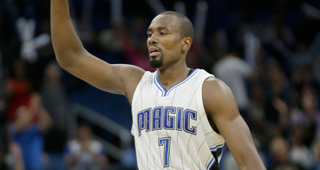When the Magic signed Bismack Biyombo this summer, after previously trading for Serge Ibaka at the draft, the thought was Orlando would have a potentially elite defense. The second thought was: where is the offense going to come from? One month into the season, we still have the same thoughts on Orlando.
Let’s cover the defense first, because they have been as good as expected on that end of the floor. Orlando ranks seventh in the league in Defensive Rating, with a rating of 103.9. They rank even better in Opponents PPG, currently sitting at third and allowing just 97.8 PPG. The Magic also allow opposing teams to shoot 44.1% (11th in the league) and, more importantly, only 33.1% from behind the arc (4th in the NBA).
Frank Vogel runs a fairly simple system on defense that involves hedging on pick and rolls and dropping back to protect the basket. This is where athletic defenders who move well like Ibaka, Biyombo and Aaron Gordon come in. They all excel at helping on ball handlers, but recovering back to their man or dropping into the paint to protect the rim. The wings and guards are asked to stay attached to shooters, which helps the Magic allow only 23 three-point attempts per game. They don’t double a lot and they don’t gamble, so they don’t force a lot of turnovers. But for a system that is built on being sound versus taking risks, all the numbers are checking out great. And, as the team builds cohesion from the all offseason additions, they are playing even better. To sum it up, the Magic seem well on their way to being an elite defensive team.
On the other side of the ball, the picture isn’t nearly as rosy. When Ibaka was acquired, the natural question was: what happens with Gordon now? Ibaka is a natural power forward and Nikola Vucevic was still around at center. The answer was that Gordon would shift to being a full time three. In a lineup that already featured a non-shooter at point guard in Elfrid Payton, this led to the next logical question: who is going to shoot?
While “pace and space” has been around for years, teams continue to take it to new heights every year. Pace is continually being pushed and space comes in the form of layups or threes and nothing in between. Orlando seemed to be eschewing the space part of the equation, as Gordon, Payton and Vucevic aren’t known for their range. That puts a lot of pressure on Evan Fournier and Ibaka to add the shooting necessary to space the floor. Doubling down on the interior defense by signing Biyombo certainly didn’t address any of the concerns. The other free agent additions of Jeff Green and D.J. Augustin could both help, but Green has been inconsistent as a shooter and Augustin was ticketed for a backup role.
With the entire story laid out, how has the team actually performed as an offensive unit? The short answer is: terribly so far. But there are good things happening already and some fixes. Let’s start with something good. Ibaka has been excellent. He has a career high Usage Rate and is shooting the best he’s ever shot since making the three part of his game. And he’s defending at least as well as he had in his final years in Oklahoma City.
Evan Fournier has been a bit of a mixed bag. He’s handling the ball more than ever, but he’s also seeing more defensive attention than he ever has. His numbers are still good, and they are getting better lately (more on that in a bit). He’s established himself as Orlando’s best offensive player and it is by a fairly wide margin.
The rest of the offense has been pretty bad. The easy answer to fix it is a trade. But trades, even small ones, are incredibly difficult to pull off in the NBA. For every trade that happens, there are dozens upon dozens of talks that go nowhere. Let’s take trades out of the picture and come up with ways the Magic can fix this with what they have.
- Continue starting Augustin: By starting Augustin, the Magic have opened up the floor just a touch more. Considering that move was accompanied by starting Biyombo, it had to happen. The less talked about part of this move was putting the ball in Fournier’s hands more and asking him to be a playmaker. With the extra room to put the ball on the floor and attack the paint, Fournier is able to make plays for himself and his teammates. And his shooting and scoring is ticking upwards with Augustin giving him that space.
- Figure out how to give Vucevic more time: Vucevic, until this year, has been a wonderful offensive talent who struggles on defense. Everything has flipped this season. He’s been one of the better interior defenders, simply by using Vogel’s method of verticality. On offense he’s been a shell of his former self. His scoring has dropped nearly 6 PPG and his shooting percentage is all the way down to 43%. The easy suggestion is that he’s taking too many long jumpers, but that would be wrong. His FGAs from 10 feet to the three point line are actually down about 4%. He’s shooting more often right at the rim and about the same amount inside the paint. The odd part is that his FG% at the basket has dropped from around 64% for his career to 53%, which is very low for a big man. More concerning, he’s at just 40%, down from over 45% for his career, from 10 feet and in. And the poor shooting has inexplicably extended to the free throw line, where he’s shot his worst percentage since becoming a full time starter at only 58%.
There doesn’t seem to be anything physically wrong with Vucevic. His shot just seems to be off. The eye test says he’s rushing things. Perhaps the lack of spacing is causing him to try and got his shots up quicker before the defense collapses. By giving him more room to operate, and letting him touch the ball earlier in the clock, he can take his time to get up better shots. No matter what, getting Vucevic’s confidence back is a major key if the Magic want to improve.
- Finding a way to get Gordon minutes at PF: Gordon is an athletic marvel. He’s quicker than most opposing bigs, but still strong enough to work through them inside. Playing him at SF marginalizes those strengths. He’s not a good enough shooter (only 27% from behind the arc and 39% overall) to hang around the perimeter. He’s rarely involved in pick and roll actions, as most of that is reserved for Ibaka or Vucevic. Essentially, one of the most exciting talents in the NBA is sitting behind the arc waiting for a ball that rarely comes, and one he can’t do anything good with when it does.
Starting him at SF is fine, if that is where you want him to develop. But when Ibaka needs a rest, why not slide Gordon to the four? Stagger their minutes and give Gordon some time to function as a big. It would do wonders for the offense and Gordon’s confidence as a whole.
- Play Jodie Meeks when he returns from injury: This one is simple. Play Meeks when he gets back, which should be around the corner. Orlando might even consider starting him, moving Fournier to the three and pushing Gordon to the bench. Meeks needs to be given a chance for his shot to help the team.
- Push pace: Saved the most simple, but most important, for last. Whenever a team struggles for offense, one of the things you want to do is carve out easy offense. The easiest way to do that is to push the ball and get shots up before the defense can set itself. Frank Vogel hinted at knowing the Magic might struggle for points at Media Day when he suggested he wanted them to play at a fast pace.
Unfortunately, the Magic haven’t followed through. They currently sit 24th in the league in pace. For a team with as many young, athletic players as the Magic have, they should be flying up the floor. By pushing the ball, they can maximize the skill sets of Payton and Gordon. Fournier can run with those players and Vucevic and Ibaka are ideal trail men, either diving to the rim off penetration or taking open jumpers. This also has the added benefit of being an exciting style that fans and players love. Increasing interest in the team from both of those groups never hurts.
While there are trades that could certainly help, all of the pieces are in place for the Magic to improve offensively with what they currently have. Better usage of those pieces and execution would go a long way. If one of the league’s worst offenses could crack even the top 20, a potentially elite defense could carry Orlando back to the postseason for the first time in five years.



